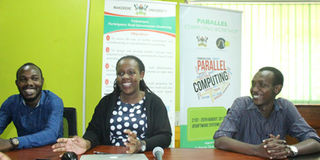Makerere 'Shuttle Alert' App wins international award for efforts in fighting kidnap

Marriette Katarahweire, a lecturer from the Department of Computer Science, the project supervisor together with some of her students Elijah Gatale and James Okoth whose App got a global recognition. PHOTO BY URN
A real-time mobile application designed to provide students with an up-to-date minute visualization of the hostel shuttle’s location at Makerere University last month received international recognition in the 2019 World Congress on Undergraduate Research –WCUR.
Dubbed ‘Shuttle Alert’, the application was developed by a team of five undergraduate students from the institution’s College of Computing and Information Sciences –CoCIS.
The App’s main objective is cub time wastage by students while waiting for their hostel shuttle to arrive at a particular pick-up point but also reduce on risks such as kidnappers, thugs, con-men who they might find along the way, in case of frustration arising from waiting for shuttles with futility.
Elijah Gatale, James Okoth, William Mugisha, Jonathan Rukundo and Paul Okiring, all graduates of Bachelor of Science in Computer Science from the Makerere School of Computing & Informatics Technology sought to solve challenges that university students who reside in hostels face in their daily commute to the Campus.
They won top honors in the Communication category and received a manually crafted trophy in addition an official certificate. The award also was accompanied by a financial token of 500 Euros, slightly above Shs2million plus mentorship.
This was at the just concluded 2019 Undergraduate Research competitions held at the University of Oldenburg in Germany, where 244 student researchers from 92 universities and institutions in 35 countries all over the world participated.
The project emerged the best out of the 29 research projects submitted from the African countries of Egypt, Ethiopia, Kenya, Malawi, Mozambique, Nigeria, South Africa, Uganda, Zambia.
Students in their project observe that under the current hostel shuttle system, students have a vague idea about the precise time a shuttle is supposed to arrive at a particular pickup point and they end up resorting to guesswork.
“As a result, they waste valuable time just standing along the university pathways, full of anxiety. Out of frustration, students sometimes opt to walk back to their hostels, a situation that puts their lives in danger,” says Gatale, the team leader.
James Okoth, says this Shuttle Alert eliminates questions like “where is the shuttle?” and “when will it be here” adding that it alerts students once the shuttle is in a radius of 50 meters within their reach.
The App allows students to register using their email address, phone contact and hostel of residence. It also has a provision that allows students to places orders and alerts drivers of specific points, students would wish to be picked. A student receives both a text message and audio alert.
A study conducted among hostel custodians, shuttle drivers and Makerere University students residing in hostels within Kikoni and Wandegeya, Kampala suburbs found that majority of students, about 68.6% rely on their hostel shuttles to make their way to and fro campus.
Others about 22.9% walk to campus, 8.6% of the students rely on Boda bodas while the rest of the students use their personal vehicles to find their way to campus.
Having seen her students receive a global recognition award, Marriette Katarahweire, a lecturer from the Department of Computer Science said, “It was a very exciting moment when they sent me an email that they have won an award and it was a very good moment because that means that the challenges that exist are actually real, and that the solutions that they provide are also real and are appreciated,” Katarahweire discloses.
She advises students to believe in themselves and take on the chances and opportunities once they arise.
Katarahweire avers that if Shuttle Alert positively impacts the hostel shuttle system, it has a possibility of being scaled much further to allow it cater for other transportation means such as employee shuttles, public buses, taxis, trains and Boda bodas.
In the past, the CoCIS has made innovations like the Malaria test with no prick and Mama kit that is able to Scan pregnant women.
Last month, also from the same college; AirQo Project, an air monitoring project that uses Artificial Intelligence (AI) and low-cost technologies to generate and quantify data on air pollution in the designated areas in Uganda won a US$1.3million Google AI Impact Grant. In 2016, Samuel Mugarura, a student at Makerere also made tear gas and was arrested by the government.



